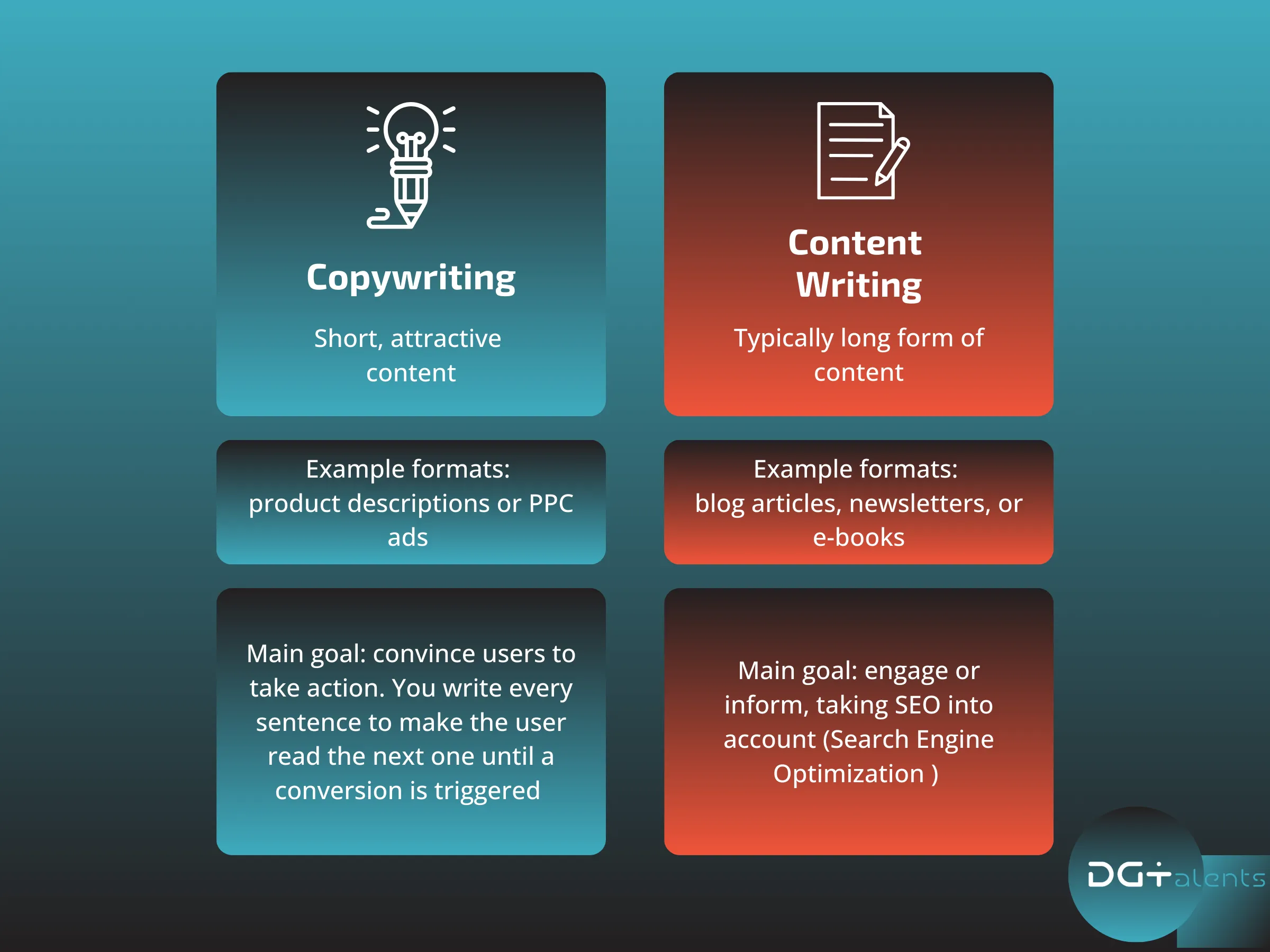Do you differentiate between copywriting and content writing? Do you know when to utilize each in favor of your online business?
Often, these two concepts are perceived as synonymous, although they have distinct, complementary purposes. In practice, you will encounter specialists who struggle with one but excel at the other.
With this article, we aim to illustrate how these two work in tandem and help you understand what you need when working on your digital marketing and business.
What Is Copywriting, and What Is Content Writing?
Content writing frequently aims to inform, engage, or entertain. We develop the DGTalents blog to add value to readers and address the most common questions related to online presence and positioning. When it comes to persuasion, selling, or issuing a call to action in a concise format, we rely more on copywriting techniques.

Based on the Length of the Text
Typically, you need a content writer to create longer content formats, often exceeding 1000 words. These include blog articles, ebooks, newsletters, and more. When it comes to copywriting, it's most often required for advertising formats, social media posts, product descriptions, and all other shorter texts. However, these are not strict rules, but rather observations imposed by practice.
Based on the Purpose of the Text
The primary goal of content writing is SEO optimization. By crafting lengthy blog articles or website pages, your aim is to convince search engines that the content you publish is the best answer to user queries within your category. With copywriting, we often emphasize creativity and nearly complete freedom of expression to maximize reader impact. Despite the theoretical difference between copywriting and content creation, businesses increasingly require a combination of the two, known as "SEO copywriting."
How to Create Successful Content
It's time to share the similarities between copywriting and writing texts for online formats, specifically the best practices that make them effective.
Distinguishing a Good Text
"Engaging," "informative," "useful," "impactful." If these words don't describe your text, you probably haven't done well. Here are a few quick tips to try out:
How to Keep the Reader Engaged
- Ensure you know who you're writing for. If you're not familiar with the audience that should be reading your text, your chances of successful impact through your words are nearly zero.
- Maintain consistency in your expression. Your texts may incorporate information from various sources and share diverse thoughts, ideas, or recommendations. Strive to make them all sound like a cohesive piece, by a single author.
- Use a conversational style. This doesn't imply dialect, jargon, or excessive informality. Writing for web formats allows for flexibility and more individuality compared to content found in print or academic sources. You are not obligated to use complex language, overly intricate sentences, or lofty phrases. Write the text as if you are speaking to your potential buyer, user, client, or partner.
- Edit. Edit again. You'll always find ways to phrase your thoughts better in terms of grammar, vocabulary, punctuation, expression, or flow. And if this advice doesn't apply to you and you always get it right the first time, please apply for a position on our team. You're approved.
- Master emotional expression and smooth transitions between ideas in your text. Our previous advice is a good example in this direction.
Satisfying Needs Through Your Text
We've already emphasized how important it is to understand the audience for whom you're creating content, along with their online behavior, problems, and preferences. These needs don't necessarily have to be fundamental, but it's crucial to know what would motivate people to take action. For instance, it's valuable to recognize that iPhone users don't just need a mini-computer in their pocket for communication. What Apple knows very well is that their products symbolize social status and fulfill far-reaching needs beyond having a mobile phone with Internet access. Look around, and you'll see how many products and services add value to their users well beyond their characteristics or functionalities. In summary, pinpoint the needs of your target audience that your texts can fulfill, as these needs are often not the most obvious or literal ones.
Optimizing Your Content for Search Engines
If you're already familiar with SEO, you're likely aware that creating the text is only part of on-page optimization for search engines. It's important here to be aware of the keywords that users use when searching for content like yours. It's also important to use them correctly in the page metadata and appropriate places within the text, without overstuffing artificially.
Learn more on the topic in our article: What is SEO and How Does It Work
So, Copywriting or Content Writing?
We're certain that your business needs both. We're also certain that you usually expect to receive them from the same specialist. The purpose of this article is to inform you about the core difference that exists in theory and to draw your attention to the fact that not everyone creating creative and impactful texts can add real value to your business, and vice versa.
Also, have in mind that copywriting and content writing for web formats are only a part of your entire marketing mix and your content strategy. Also don't forget that you need to add to them all activities, related to your brand strategy, SEO, attractive design, online advertising, email marketing, etc.
If you need content creation or copywriting, turn to our team for assistance. We are familiar with best practices and can help your business stand out online.




